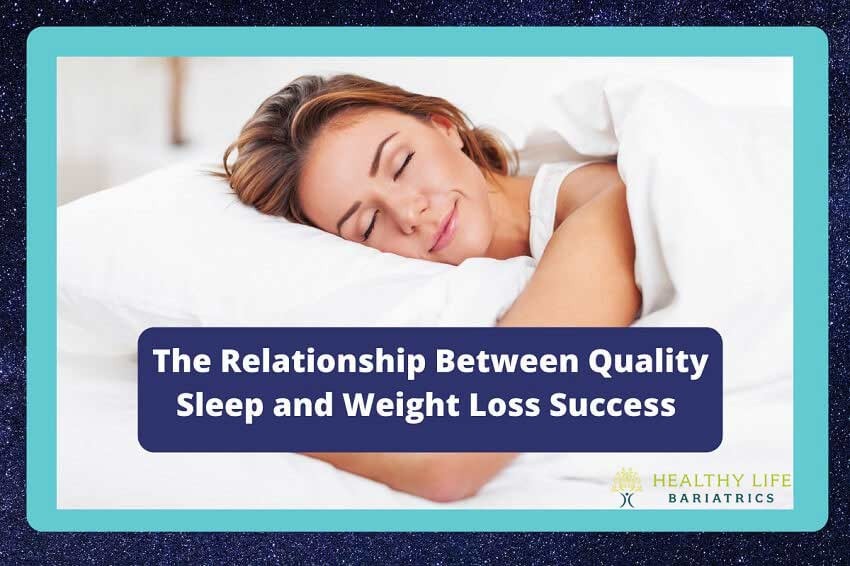
Weight loss medications or surgeries promote success in your weight loss journey and quality sleep. Is quality sleep have some connection with your weight loss medication success?
Learn how these factors are connected.
The connection between sleep and low body weight is well documented.
The better rested you are, the easier it is to keep the excess pounds at bay.
Conversely, people who get very little sleep are more likely to be overweight or obese.
The logical conclusion is that if you want to lose weight, you might want to focus on how well you’re sleeping.
Weight loss or bariatric surgery aims to help you lose weight through medical intervention.
Various procedures work in different ways. Gastric sleeve surgery, for instance, makes your stomach smaller.
There are also hormonal changes that affect hunger, fullness, and other elements of your body, such as your metabolism.
These elements work together to help you lose weight.
You eat less food, feel less hungry, and the weight falls off after bariatric surgery.
This is good news for obese adults who report difficulty in losing weight.
Their bodies seem to work against them. No matter how hard they diet, or how much physical activity they engage in, the excess pounds cling desperately to their bodies.
Sound familiar?
Weight loss surgery is like flipping a switch.
You still have to work hard, but the changes made during bariatric surgery make it easier to lose weight.
You’ll have an easier time dropping the excess pounds if you manage to sleep soundly through the night.
If you are attempting to battle the disease of obesity, keep reading to learn more about the impact of sleep and its relation to weight loss success.
What Does Sleep Loss Have to Do with Weight Loss?

Scientists have discovered that when a person sleeps only a few hours per night, they tend to accumulate fat more easily.
The fat is also harder to burn off, even with a proper diet and strenuous exercise.
That’s not all.
Sleep curtailment is also related to:
Increased Appetite
The signals that tell your brain when to eat are controlled by neurotransmitters.
These chemical messengers allow nerve cells (neurons) to communicate with one another.
Two specific neurotransmitters – ghrelin and leptin – are at the center of your appetite.
Ghrelin is the hunger hormone. Whenever your tummy rumbles, ghrelin is to blame.
Leptin contributes to that fullness feeling you get whenever you’ve eaten your fill.
To help your body gain and burn energy effectively, these two hormones work in constant flux, balancing one another out. Or at least that’s how it’s supposed to work.
When you don’t get enough sleep, your system can go haywire.
One study found that men who slept four hours per night had increased ghrelin and decreased leptin compared to those who slept ten hours nightly.
This would have the effect of keeping the men constantly hungry and never full, which leads to a greater than average daily energy intake (extreme overeating).
You may have found yourself in that situation at one time or another. Opening the fridge because you’re starving even though you recently ate. It could have been low-quality sleep that caused your insatiability.
Other studies have shown that sleep deprivation can lead to poor food choices.
For example, getting insufficient sleep tends to make people crave high-calorie and carb-heavy foods.
Lack of Sleep Slows Your Metabolism
When we refer to your metabolism, we mean the chemical process where you convert the food and drinks you consume into energy necessary for survival.
Your metabolism also involves a series of collective activities like breathing and exercising.
You already know that exercising can temporarily increase your metabolism.
When you sleep, your metabolism slows down about 15%. It will then increase as you wake and go about your day.
When you deprive yourself of sleep, your metabolism can remain in a dampened state.
Whether your sleep deprivation is attributed to insomnia or any other cause, you can form what is known as metabolism dysregulation.
This means that you have greater oxidative stress. You may form blood glucose or blood sugar intolerance, which is a precursor to diabetes. Insulin resistance may follow.
As you remain awake, you present more opportunities to eat more food and consume calorie-laden beverages, which can contribute to extreme weight gain.
No Sleep Saps Your Energy for Exercise
Skipping out on enough sleep leaves you with less energy to exercise during the day.
Without enough activity, you are more likely to gain and retain excess weight.
Lack of sleep can also make your job potentially dangerous if you work with heavy machinery or drive for a living.
Getting Enough Sleep Can Help You Lose Weight

Better sleep quality has been shown to increase the likelihood of weight loss success by 33%.
Getting adequate sleep is an important aspect of any healthy weight loss plan.
Sleeping through the night can also help with cravings while preventing overeating.
How much sleep should you be getting?
Scientists define quality sleep as around six to seven hours of sleep per night.
How to Sleep Well to Lose More Weight
Quality sleep means paying attention to healthy sleeping habits.
Here are some tips to help increase the quality of your sleep each evening.
Keep a Schedule
An insufficient sleep schedule can create havoc with your metabolism while reducing insulin sensitivity.
Try to go to bed and wake up at the same time each day to keep your metabolism running efficiently like clockwork.
Sleep in a Dark Room
Sunshine or street lights shining through your windows can interrupt your sleep.
Try to darken your windows with shades or curtains and keep artificial light sources like TVs and bedside lamps turned off.
Reduce Stress
Feeling stressed all the time can lead to poor sleep quality and weight gain.
A stressed-out mind is also more likely to think negative thoughts.
You’ll sleep much easier if you manage to relax in the hours before bedtime.
Try meditating, reading, or playing soft music to help you wind down and relax before bedtime.
Be an Early Riser
Staying up past midnight may feel rebellious, but you’re putting yourself at higher risk for weight gain.
Early birds tend to weigh less and keep the weight off compared to their night owl counterparts.
Sleep Apnea and its Effect on Weight
People who achieve a high enough BMI to be categorized as obese often suffer from one or more comorbidities. These weight-related ailments include diseases like type 2 diabetes, heart disease, and osteoarthritis.
Sleep apnea is another comorbidity that can contribute to poor sleep quality, weight gain, and an inability to lose weight.
Obesity is a contributing factor for the development of sleep apnea (also referred to clinically as obstructive sleep apnea).
This sleep disorder involves the collapse of the soft tissues of the throat. This happens during sleep, which can cause you to stop breathing.
People who are obese have thicker tissue surrounding the throat, which can contribute to sleep apnea.
During an episode, the diaphragm and chest muscles must work harder to keep the airway open.
This results in changes in blood pressure and the cessation of breathing.
Other people may see you jerk awake several times a night or make loud gasping noises, which are signs of sleep apnea.
Suffering from this condition can lead to insufficient sleep quality and the loss of necessary oxygen to vital organs.
If left untreated, sleep apnea can lead to an increased risk of heart rhythm irregularities, hypertension, strokes, and heart attacks.
Weight Loss Surgery Can Improve Your Sleep

If you find it difficult to lose weight, weight loss surgery can help.
Popular surgeries like the gastric sleeve and gastric bypass can help you lose up to 60% to 70% or more of your excess weight.
Losing a mere 10% of your excess body weight can reduce the effects of insufficient sleep dramatically.
Losing weight can also boost your confidence and your health, not to mention potentially helping you live a longer life.
Bariatric Surgery Can Treat Sleep Apnea
There are treatments available for sleep apnea, such as the CPAP machine.
When conventional sleep apnea treatments aren’t enough, weight loss surgery is recommended if the condition is accompanied by obesity.
Bariatric surgery is the most effective treatment for sleep apnea, with remission occurring in 80% to 85% of patients.
So, let’s recap.
We now know that poor sleep quality can keep you hungry and never full.
Your metabolism slows and you feel too sapped to exercise without a good night’s sleep.
And if you have sleep apnea, you can find it even harder to lose weight.
The result may be weight gain and excess pounds that go nowhere, despite your hard work.
Weight loss surgery can help you lose weight while contributing to a better night’s sleep.
Losing weight with weight loss surgery can also treat sleep apnea.
With greater sleep duration, your hunger becomes regulated.
Your metabolism speeds up.
And you feel less stressed overall.
This contributes to weight loss success over the long term.
Just remember to practice good sleep hygiene to improve the quality of the sleep you get, and you’re sure to be the star of your own success story.
Are You a Good Candidate for Weight Loss Surgery?
If you suffer from the disease of obesity, scheduling a consultation for bariatric surgery is a good first step to reclaiming your health.
Dr. Babak Moeinolmolki of Healthy Life Bariatrics has helped many patients just like you achieve a slimmer waist, improved health, and boosted self-esteem.
Do you want to achieve weight loss success?
Schedule your consultation today by calling Healthy Life Bariatrics. Ask about our medical tourism program for those living outside the L.A. area. Dial now (310)861-7844.

